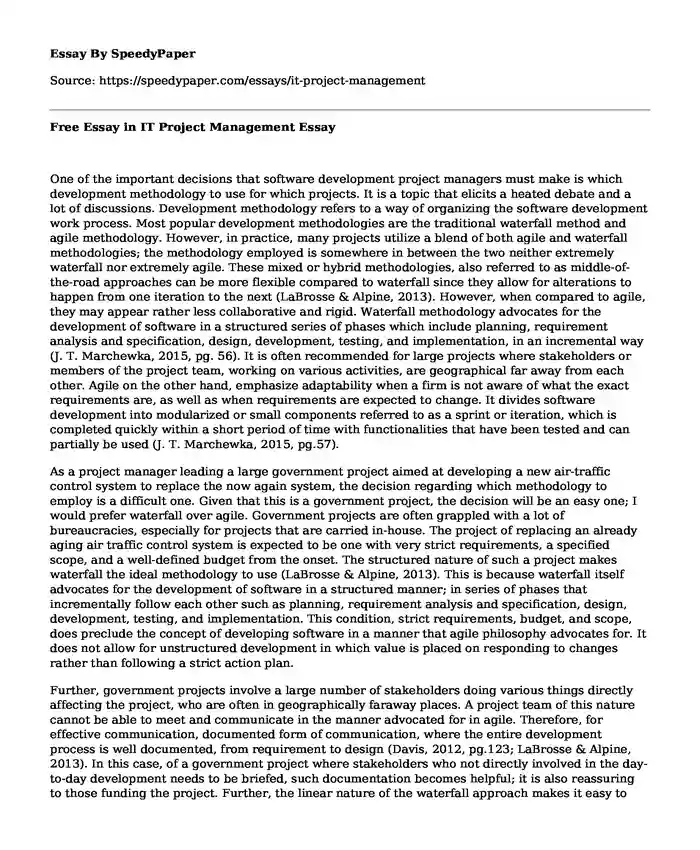
| Type of paper: | Essay |
| Categories: | Project management Information technologies |
| Pages: | 3 |
| Wordcount: | 783 words |
One of the important decisions that software development project managers must make is which development methodology to use for which projects. It is a topic that elicits a heated debate and a lot of discussions. Development methodology refers to a way of organizing the software development work process. Most popular development methodologies are the traditional waterfall method and agile methodology. However, in practice, many projects utilize a blend of both agile and waterfall methodologies; the methodology employed is somewhere in between the two neither extremely waterfall nor extremely agile. These mixed or hybrid methodologies, also referred to as middle-of-the-road approaches can be more flexible compared to waterfall since they allow for alterations to happen from one iteration to the next (LaBrosse & Alpine, 2013). However, when compared to agile, they may appear rather less collaborative and rigid. Waterfall methodology advocates for the development of software in a structured series of phases which include planning, requirement analysis and specification, design, development, testing, and implementation, in an incremental way (J. T. Marchewka, 2015, pg. 56). It is often recommended for large projects where stakeholders or members of the project team, working on various activities, are geographical far away from each other. Agile on the other hand, emphasize adaptability when a firm is not aware of what the exact requirements are, as well as when requirements are expected to change. It divides software development into modularized or small components referred to as a sprint or iteration, which is completed quickly within a short period of time with functionalities that have been tested and can partially be used (J. T. Marchewka, 2015, pg.57).
As a project manager leading a large government project aimed at developing a new air-traffic control system to replace the now again system, the decision regarding which methodology to employ is a difficult one. Given that this is a government project, the decision will be an easy one; I would prefer waterfall over agile. Government projects are often grappled with a lot of bureaucracies, especially for projects that are carried in-house. The project of replacing an already aging air traffic control system is expected to be one with very strict requirements, a specified scope, and a well-defined budget from the onset. The structured nature of such a project makes waterfall the ideal methodology to use (LaBrosse & Alpine, 2013). This is because waterfall itself advocates for the development of software in a structured manner; in series of phases that incrementally follow each other such as planning, requirement analysis and specification, design, development, testing, and implementation. This condition, strict requirements, budget, and scope, does preclude the concept of developing software in a manner that agile philosophy advocates for. It does not allow for unstructured development in which value is placed on responding to changes rather than following a strict action plan.
Further, government projects involve a large number of stakeholders doing various things directly affecting the project, who are often in geographically faraway places. A project team of this nature cannot be able to meet and communicate in the manner advocated for in agile. Therefore, for effective communication, documented form of communication, where the entire development process is well documented, from requirement to design (Davis, 2012, pg.123; LaBrosse & Alpine, 2013). In this case, of a government project where stakeholders who not directly involved in the day-to-day development needs to be briefed, such documentation becomes helpful; it is also reassuring to those funding the project. Further, the linear nature of the waterfall approach makes it easy to understand for non-developers or people who are new to software development, which most people involved in a government project such as this are. Agile would not be ideal for this project because the nature of bureaucracy in government makes agile practices a bad fit; particularly in cases where the projects are in-house, which is the case here.
In the case of developing a new game that is to be sold as an application running on popular smartphones, agile development methodology will be chosen. Agile methodologies, as already noted, eschews a sequential, linear approach in favor of a more iterative and incremental one. Given that the end product for this game, its expected outcome, is not clear to stakeholders such as users, initial extensive planning, as well as design is not necessary. Agile enables the alteration of requirements throughout the lifetime of a project; this is achieved through cross functional teams made up of developers, designers, analysts, planners, as well as testers. This team will work on successive increments or iterations of the final product over fixed periods. The order of work is based on users value. In agile teams are considered to be self-organizing and includes a representative of the product or business owner
Cite this page
Free Essay in IT Project Management. (2021, Jan 25). Retrieved from https://speedypaper.net/essays/it-project-management
Request Removal
If you are the original author of this essay and no longer wish to have it published on the SpeedyPaper website, please click below to request its removal:
- Health Status Essay Example
- What Makes You an Individual? Free Essay Sample
- Essay Example on Protecting Critical Information Infrastructures
- HRM Essay Example: What Do You Think Yahoo Is Doing?
- Paper Sample: The American Healthcare Delivery System
- Essay Sample: How My Knowledge, Skills, and Abilities Improved During the Session
- Essay Sample on Howard Gardner's Theory Of Multiple Intelligence
Popular categories




